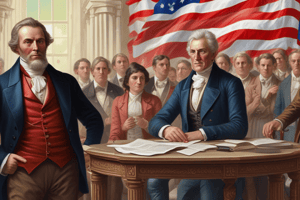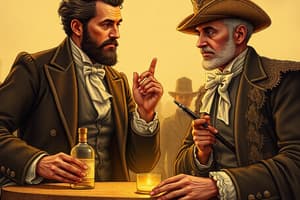Podcast
Questions and Answers
Who won the presidency after the House of Representatives selected the president in the election of 1824?
Who won the presidency after the House of Representatives selected the president in the election of 1824?
- No one was selected
- Andrew Jackson
- John Q. Adams (correct)
- Henry Clay
What was the outcome of the election of 1824 that led to the split in the Democratic party?
What was the outcome of the election of 1824 that led to the split in the Democratic party?
- Henry Clay became the Speaker of the House
- No candidate received a majority, leading to a re-election
- Andrew Jackson won the election by a large majority
- John Q. Adams was elected president through the influence of Henry Clay (correct)
How did Andrew Jackson employ new campaign tactics in the election of 1828?
How did Andrew Jackson employ new campaign tactics in the election of 1828?
- By avoiding public appearances
- By seeking support from political elites
- By using negative ads against John Q. Adams
- By organizing rallies, parades, and nominating conventions (correct)
What was one of the main reasons for Andrew Jackson's victory in the election of 1828?
What was one of the main reasons for Andrew Jackson's victory in the election of 1828?
What happened at the White House celebration after Andrew Jackson's inauguration?
What happened at the White House celebration after Andrew Jackson's inauguration?
Democratic changes were on the horizon. Many states did away with making white males own property in order to ______, increasing voter participation.
Democratic changes were on the horizon. Many states did away with making white males own property in order to ______, increasing voter participation.
Jackson helped ordinary citizens start playing a part in ______.
Jackson helped ordinary citizens start playing a part in ______.
Jackson believed that government officials were corrupt, so he fired old government officials and put people who supported him in their ______.
Jackson believed that government officials were corrupt, so he fired old government officials and put people who supported him in their ______.
Match the following electoral changes with their impact:
Match the following electoral changes with their impact:
Match the following actions with their impact on politics during Andrew Jackson's time:
Match the following actions with their impact on politics during Andrew Jackson's time:
Match the following beliefs and actions with their consequences:
Match the following beliefs and actions with their consequences:
Flashcards are hidden until you start studying
Study Notes
The Election of 1824
- The House of Representatives selected the president in the election of 1824, and John Quincy Adams won the presidency.
The Aftermath of the Election of 1824
- The outcome of the election led to a split in the Democratic party.
The Election of 1828
- Andrew Jackson employed new campaign tactics, such as using newspapers and posters to reach a wider audience.
- One of the main reasons for Andrew Jackson's victory was the increased voter participation, particularly among the common people.
Jackson's presidency
- At the White House celebration after Andrew Jackson's inauguration, a large crowd of people gathered, causing damage to the White House.
Democratic Changes
- Many states abolished the property qualification, allowing all white males to vote, which increased voter participation.
- Jackson helped ordinary citizens play a more significant role in politics.
Spoils System
- Jackson believed that government officials were corrupt, so he fired old government officials and replaced them with his supporters.
Electoral Changes
- Abolishing property qualifications: increased voter participation
- Using newspapers and posters in campaigns: increased voter awareness and participation
Impact on Politics
- Firing old government officials and replacing them with supporters: led to the creation of the spoils system
- Increasing voter participation: led to a shift in power from the elite to the common people
Consequences of Beliefs and Actions
- The spoils system: led to a more corrupt government and a system of patronage
- The increased voter participation: led to a more democratic government and a shift in power from the elite to the common people
Studying That Suits You
Use AI to generate personalized quizzes and flashcards to suit your learning preferences.




